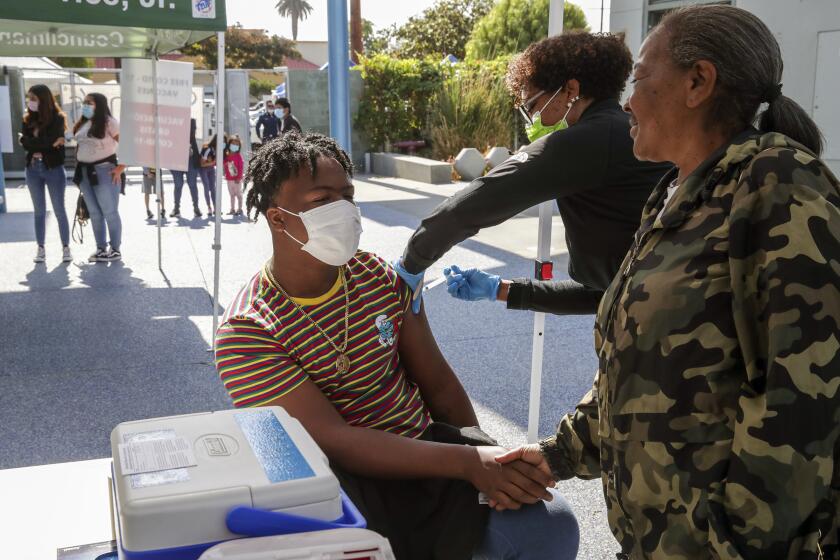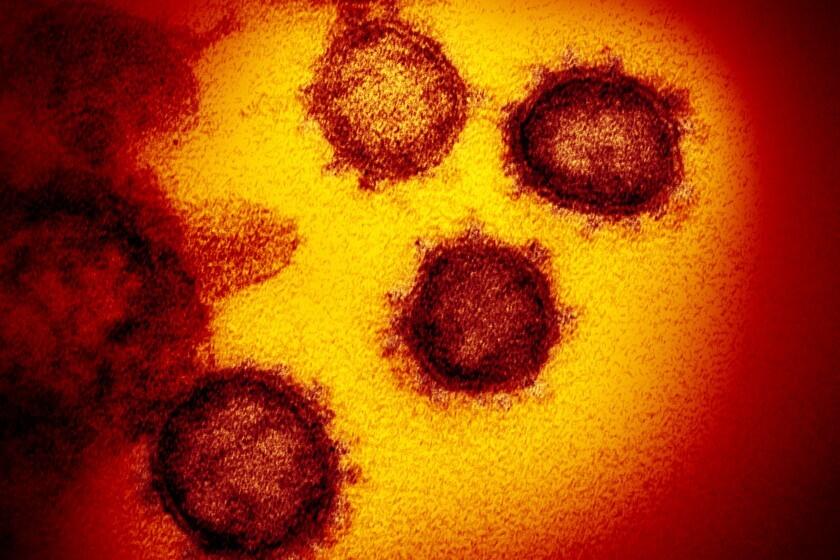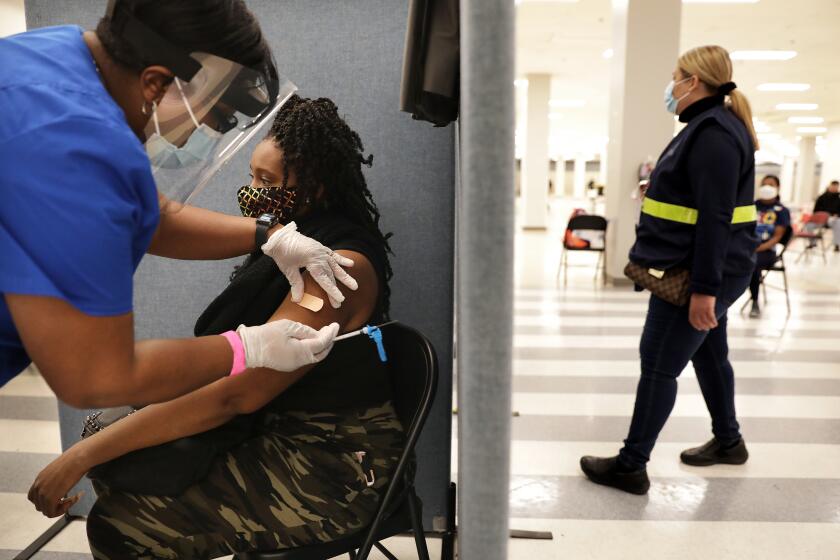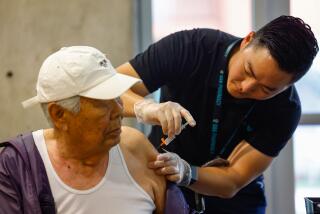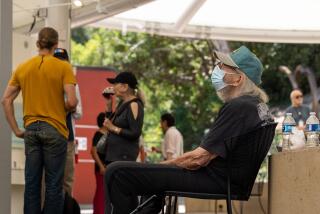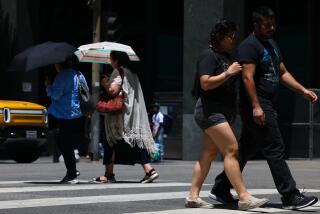Coronavirus cases in California rise for first time in months as Delta variant spreads
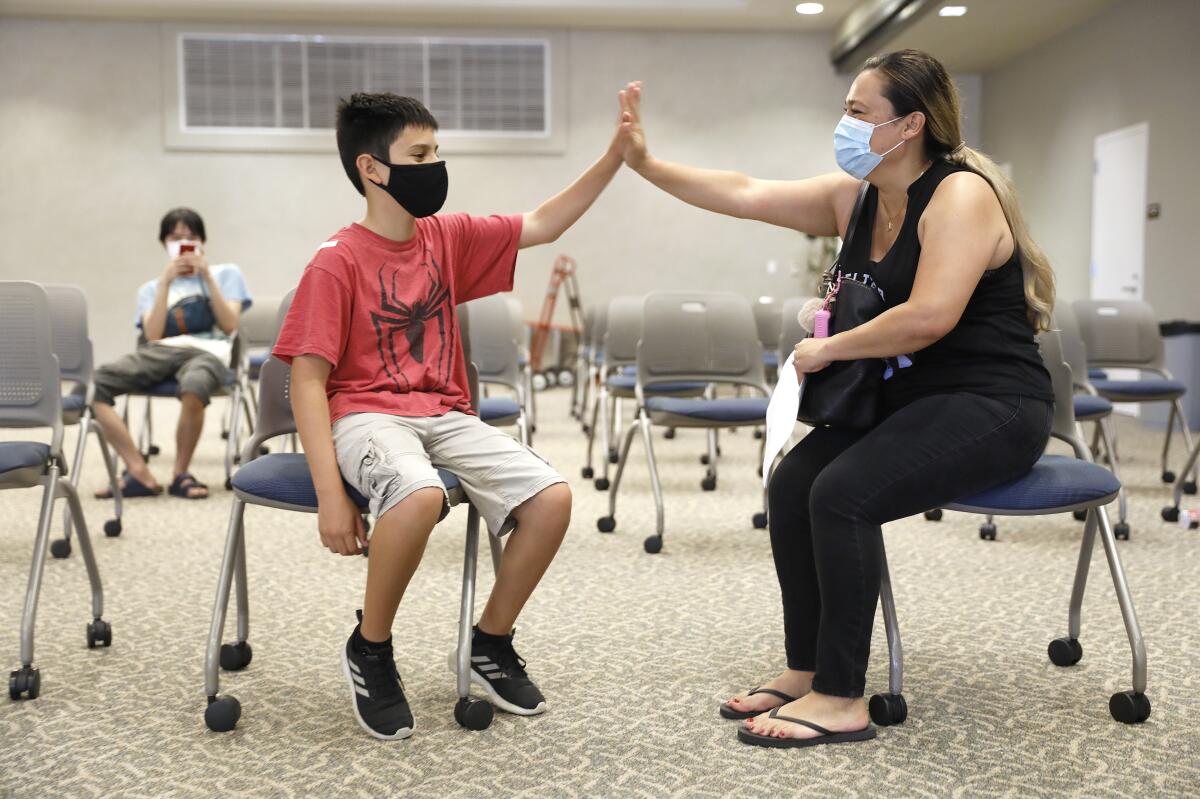
- Share via
After months of steady declines, coronavirus infections are once again on the rise in California as the state struggles with slowing daily vaccination rates and the spread of the highly infectious Delta variant.
While it’s too soon to say whether the upticks are a trend or a blip, health experts and state officials expressed confidence that California’s reopening and the return of something resembling normality were not in jeopardy.
“This is the call to anyone who hasn’t been vaccinated: Get vaccinated,” Gov. Gavin Newsom said during a briefing Wednesday. “What more evidence do you need?”
There is widespread scientific consensus that fully vaccinated people have an excellent chance of being protected from severe illness or death from any coronavirus strain, including Delta. In both Los Angeles and San Diego counties over the past half-year, 99.8% of people who died from COVID-19 had not been inoculated.
Overall levels of coronavirus cases and hospitalizations remain at historically low levels, and California has one of the highest vaccination rates in the nation, in a country that has one of the fastest vaccination rates in the world. The number of COVID-19 deaths reported daily in California remain among the lowest over the past 15 months — it’s down to 18 deaths a day, down from a peak of 537 deaths a day for the seven-day period ending Jan. 27.
Over the past seven days, in L.A. County, COVID-19 deaths have dropped to four a day; the San Francisco Bay Area, 1.5 a day; Orange County, 0.6 a day and San Diego County, 0.3 a day.
While those vaccinated against COVID-19 are believed to have protection against the variant, more people who have not been vaccinated are getting sick.
California averaged about 1,143 new daily coronavirus cases over the seven-day period that ended Tuesday, a 30% increase from mid-June. It’s part of an uptick that began shortly after the state fully reopened its economy on June 15. The lowest average number of cases since March 2020 occurred during the seven-day period ending June 24, when there were 881 a day reported. Still, the latest numbers are more than 97% lower than the peak of the pandemic in the winter, when California was averaging more than 45,000 cases a day.
COVID-19 hospitalizations also have risen by 34% since mid-June. On June 12, California reported 915 patients, a low since the state began systematically tracking COVID-19 hospitalizations. By Tuesday, that number had climbed to 1,228 patients. But the latest hospitalization figure is still 94% lower than it was during the peak of the pandemic, when nearly 22,000 Californians were in hospitals with COVID-19.
On a per capita basis, that means there are now 3.1 Californians hospitalized with COVID-19 for every 100,000 residents. That’s substantially lower than the threshold of 5 hospitalizations per 100,000 residents that some experts have said is an indicator that it is safe to lift mask requirements.
From Jan. 1 to June 30, less than 0.043% of the more than 20 million people fully vaccinated statewide tested positive at some point, according to the California Department of Public Health. Even a more infinitesimal number of people became sick enough to require hospitalization, 0.003%, or who ultimately died, 0.00035%.
Though it’s unknown how many of those “breakthrough” cases were the work of the Delta variant, which is believed to be twice as transmissible as the conventional coronavirus strains, officials say the available data underscore a key point: Fully inoculated individuals are extremely well-protected from infection, and even more so from the worst health impacts of COVID-19.
The highly infectious Delta variant has become California’s most identified strain of the coronavirus, a troubling development.
“Almost without exception, everybody that’s getting hospitalized, the people who have lost their lives, have been hospitalized or lost their lives because they haven’t been vaccinated — period, full stop,” Newsom said.
The U.S. Centers for Disease Control and Prevention estimates the Delta variant now comprises 51.7% of coronavirus cases nationally. But it’s also important to note that there are just 14,000 new cases a day nationally, among the lowest numbers over the past 15 months, and 95% lower than the peak in January.
Delta is also California’s most identified variant, accounting for 35.6% of cases analyzed in June — up from 5.6% in May and 2.1% in April, when it was first identified in the state. And in L.A. County, for the week that ended June 19, Delta made up nearly 50% of coronavirus cases that were analyzed; four weeks earlier, it accounted for less than 5%.
Invariably, there have been scattered reports that have occasionally raised questions about whether vaccines have lowered effectiveness against the Delta variant, including one that emerged out of Israel suggesting that the effectiveness of vaccines available there to protect against symptomatic illness had fallen to 64%, although they remained 93% effective in preventing hospitalization.
There are many more robust studies that consistently point to strong protection afforded by the vaccines against Delta, and officials have urged the public not to overreact to a single report. In studies cited by Dr. Anthony Fauci, the U.S. government’s top infectious disease expert, the Pfizer-BioNTech vaccine was found to be 88% effective against symptomatic disease from the Delta variant and 96% effective against hospitalization.
The differing results of the Israeli report may be due to different methodologies, such as rigorously testing vaccinated people for a coronavirus infection even though they had no symptoms, while other studies might only test people who are visibly ill, said UCLA epidemiologist and infectious diseases expert Dr. Robert Kim-Farley.
“Bottom line, however, is that all these studies continue to show very good efficacy against severe disease and death,” Kim-Farley said. “The vaccines continue to do what we need them to do most.”
In addition, the Israeli report reviewed just 300 patients, and small studies can be inaccurate, Dr. Monica Gandhi, an infectious diseases expert at UC San Francisco, wrote in an email. Studies from Britain, Canada, and Singapore — reviewing records of many more people — showed 80% to 90% vaccine effectiveness against any symptomatic infection and 93% to 96% effectiveness against severe disease.
Some experts say there is good reason to have full confidence in the vaccines’ effectiveness.
“Please, no more cries of wolf on variants/vaccine efficacy,” tweeted Deepta Bhattacharya, an associate professor of immunology at the University of Arizona College of Medicine. “The vaccines still work fine in the real world.”
“Let’s be perfectly clear about the Delta variant ... this strain is not spreading like wildfire across the U.S. This strain is spreading in highly unvaccinated regions without natural immunity,” added Gandhi in a tweet.
L.A. County’s Black residents are among the groups seeing rising COVID-19 hospitalization rates. They have been less likely to have received the vaccine than other racial and ethnic groups.
“Although we will not be going back to the surges that we experienced earlier on, these increases in hospitalization are showing that we still have a ways to go, until we can get a sufficient number of persons in the population vaccinated to achieve community immunity, or herd immunity,” Kim-Farley said.
Given the state’s June 15 reopening, which saw the repeal of many coronavirus-related health restrictions, and the fact that millions of Californians remain unvaccinated, a rise in cases is not wholly unexpected. Many officials and experts say it would be more alarming if California were to see a crush of new hospitalizations — particularly among those who are fully vaccinated.
Many officials maintain that the state remains well-armored against any potential new surge, in large part because of California’s robust vaccine coverage.
Nearly 59% of all residents have already received at least one dose and about 51% are fully vaccinated, Times’ data show. However, raising those numbers to the threshold thought necessary to achieve long-lasting community immunity — typically estimated between 70% to 85% — seems like it will be slow going, as fewer than 100,000 vaccines per day are now being administered on average statewide.
L.A. County’s recent coronavirus case rate is 97% lower — and its number of hospitalized COVID-19 patients is 96% lower — than during the peak of the pandemic.
Still, weekly coronavirus cases in L.A. County have now tripled and COVID-19 hospitalizations have jumped by 40% since recent lows.
Black residents in L.A. County are roughly three times as likely as white residents to be diagnosed with the coronavirus, to be newly hospitalized with COVID-19 or to die.
Last week, the L.A. County Department of Public Health recommended that even fully vaccinated people resume wearing masks in indoor public areas until more definitive information about the Delta variant emerged.
“The big unknown is: Can you become infected — have mild illness — and go ahead and spread that infection to others?” said L.A. County Public Health Director Barbara Ferrer of the Delta variant. “We are looking for the answer to that question.”
Despite that, neither state nor federal health officials have followed L.A. County’s lead when it comes to masks — instead reiterating that they’re largely unnecessary for fully vaccinated people, given the protection the shots provide.
“The good news is that our vaccinations are highly effective. Fully vaccinated Americans have a high degree of protection, including against this Delta variant,” President Biden said Tuesday.
He added, “study after study after study has shown that, since early May, virtually every COVID-19 hospitalization and death in the United States has been among the unvaccinated. So, if you’re vaccinated, you’re protected. But if you’re unvaccinated, you’re not; and you’re putting yourself — more importantly, maybe from your perspective — your family and your friends at risk.”
People at higher risk from a breakthrough infection include those who have had solid-organ transplants or have a compromised immune system, said Dr. George Rutherford, epidemiologist at UC San Francisco.
Other fully vaccinated people at higher risk are those who have had sustained, intensive exposure to a person sick with COVID-19, for instance a parent caring for an infected child.
Experts also have said that fully vaccinated people who are in places where there are high levels of coronavirus transmission should still wear masks.
There is widespread scientific consensus on the Delta variant’s infectious potential. Some early estimates of the initial coronavirus strains suggested that every infected person, on average, transmitted the virus to 3.5 others, Rutherford said. Each person with the Delta variant could potentially transmit the virus to more than six people.
Reacting to rising infection rates, Israel on June 25 reimposed mandatory mask requirements in indoor public spaces, just 10 days after dropping most mask orders.
On the same day, World Health Organization officials — speaking in the context of places with relatively low vaccination rates and places with high rates of coronavirus transmission — said people who were vaccinated should still mask up.
“We still live in a world that is only partially vaccinated, that has a lot of susceptibility, a lot of vulnerability. So, what we’re saying is: Once you’ve been fully vaccinated, continue to play it safe because you could end up as part of a transmission chain,” said Dr. Bruce Aylward, senior advisor to the WHO’s director-general. “You may not actually be fully protected. Sometimes the vaccines don’t work in people.”
More to Read
Sign up for Essential California
The most important California stories and recommendations in your inbox every morning.
You may occasionally receive promotional content from the Los Angeles Times.
